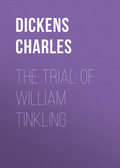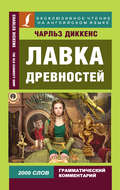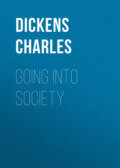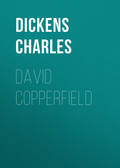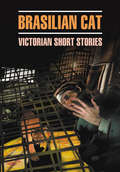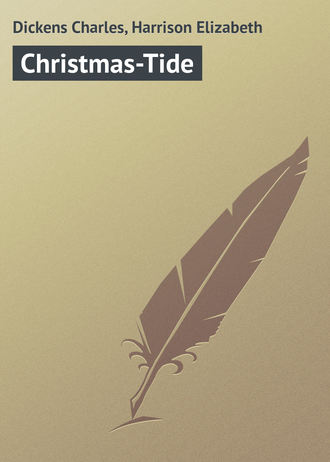
Чарльз Диккенс
Christmas-Tide
The grocers'! oh the grocers'! nearly closed, with perhaps two shutters down, or one; but through those gaps such glimpses! It was not alone that the scales descending on the counter made a merry sound, or that the twine and roller parted company so briskly, or that the canisters were rattled up and down like juggling tricks, or even that the blended scents of tea and coffee were so grateful to the nose, or even that the raisins were so plentiful and pure, the almonds so extremely white, the sticks of cinnamon so long and straight, the other spices so delicious, the candied fruits so caked and spotted with molten sugar as to make the coldest lookers-on feel faint and subsequently bilious. Nor was it that the figs were moist and pulpy, or that the French plums blushed in modest tartness from their highly decorated boxes, or that everything was good to eat and in its Christmas dress; but the customers were all so hurried and so eager in the hopeful promise of the day, that they tumbled up against each other at the door, crashing their wicker baskets wildly, and left their purchases upon the counter, and came running back to fetch them, and committed hundreds of the like mistakes, in the best humor possible; while the grocer and his people were so frank and fresh that the polished hearts with which they fastened their aprons behind might have been their own, worn outside for general inspection, and for Christmas daws to peck at if they chose.
But soon the steeples called good people all to church and chapel, and away they came, flocking through the streets in their best clothes, and with their gayest faces. At the same time there emerged from scores of by-streets, lanes, and nameless turnings, innumerable people, carrying their dinners to the bakers' shops. The sight of these poor revelers appeared to interest the Spirit very much, for he stood with Scrooge beside him in a baker's doorway, and taking off the covers as their bearers passed, sprinkled incense on their dinners from his torch. And it was a very uncommon kind of torch, for once or twice when there were angry words between some dinner-carriers who had jostled each other, he shed a few drops of water on them from it, and their good humor was restored directly, for they said, it was a shame to quarrel upon Christmas Day. And so it was! God love it, so it was!
In time the bells ceased and the bakers were shut up; and yet there was a genial shadowing forth of all these dinners and the progress of their cooking in the thawed blotch of wet above each baker's oven, where the pavement smoked as if the stones were cooking, too.
"Is there a peculiar flavor in what you sprinkle from your torch?" asked Scrooge.
"There is; my own."
"Would it apply to any kind of dinner on this day?" asked Scrooge.
"To any kindly given. To a poor one most."
"Why to a poor one most?" asked Scrooge.
"Because it needs it most."
"Spirit," said Scrooge, after a moment's thought, "I wonder you, of all the beings in the many worlds about us, should desire to cramp these people's opportunities of innocent enjoyment."
"I!" cried the Spirit.
"You would deprive them of their means of dining every seventh day, often the only day on which they can be said to dine at all," said Scrooge, "wouldn't you?"
"I!" cried the Spirit.
"You seek to close these places on the seventh day," said Scrooge, "and it comes to the same thing."
"I seek!" exclaimed the Spirit.
"Forgive me if I am wrong. It has been done in your name, or at least in that of your family," said Scrooge.
"There are some upon this earth of yours," returned the Spirit, "who lay claim to know us, and who do their deeds of passion, pride, ill-will, hatred, envy, bigotry, and selfishness in our name, who are as strange to us and all our kith and kin as if they had never lived. Remember that, and charge their doings on themselves, not us."
Scrooge promised that he would, and they went on, invisible, as they had been before, into the suburbs of the town. It was a remarkable quality of the Ghost (which Scrooge had observed at the baker's), that notwithstanding his gigantic size, he could accommodate himself to any place with ease, and that he stood beneath a low roof quite as gracefully and like a supernatural creature as it was possible he could have done in any lofty hall.
And perhaps it was the pleasure the good Spirit had in showing off this power of his, or else it was his own kind, generous, hearty nature, and his sympathy with all poor men, that led him straight to Scrooge's clerk's; for there he went, and took Scrooge with him, holding to his robe; and on the threshold of the door the Spirit smiled, and stopped to bless Bob Cratchit's dwelling with the sprinklings of his torch. Think of that! Bob had but fifteen "Bob" a-week himself; he pocketed on Saturdays but fifteen copies of his Christian name; and yet the Ghost of Christmas Present blessed his four-roomed house!
Then up rose Mrs. Cratchit, Cratchit's wife, dressed out but poorly in a twice-turned gown, but brave in ribbons, which are cheap and make a goodly show for sixpence; and she laid the cloth, assisted by Belinda Cratchit, second of her daughters, also brave in ribbons; while Master Peter Cratchit plunged a fork into the saucepan of potatoes, and getting the corners of his monstrous shirt collar (Bob's private property, conferred upon his son and heir in honor of the day) into his mouth, rejoiced to find himself so gallantly attired, and yearned to show his linen in the fashionable parks. And now two smaller Cratchits, boy and girl, came tearing in, screaming that outside the baker's they had smelt the goose and known it for their own, and basking in luxurious thoughts of sage and onion, these young Cratchits danced about the table, and exalted Master Peter Cratchit to the skies, while he (not proud, although his collars nearly choked him) blew the fire until the slow potatoes bubbling up knocked loudly at the saucepan lid to be led out and peeled.
"What has ever got your precious father then?" said Mrs. Cratchit. "And your brother, Tiny Tim! And Martha warn't as late last Christmas Day by half an hour."
"Here's Martha, mother!" said a girl, appearing as she spoke.
"Here's Martha, mother!" cried the two young Cratchits. "Hurrah! There's such a goose, Martha!"
"Why, bless your heart alive, my dear, how late you are!" said Mrs. Cratchit, kissing her a dozen times, and taking off her shawl and bonnet for her with officious zeal.
"We'd a deal of work to finish up last night," replied the girl, "and had to clear away this morning, mother!"
"Well, never mind so long as you are come," said Mrs. Cratchit. "Sit ye down before the fire, my dear, and have a warm, Lord bless ye!"
"No, no! There's father coming," cried the two young Cratchits, who were everywhere at once. "Hide, Martha, hide!"
So Martha hid herself, and in came little Bob, the father, with at least three feet of comforter, exclusive of the fringe, hanging down before him, and his threadbare clothes darned up and brushed to look seasonable, and Tiny Tim upon his shoulder. Alas for Tiny Tim, he bore a little crutch and had his limbs supported by an iron frame!
"Why, where's our Martha?" cried Bob Cratchit, looking round.
"Not coming," said Mrs. Cratchit.
"Not coming!" said Bob, with a sudden declension in his high spirits, for he had been Tim's blood horse all the way from church, and had come home rampant; "not coming upon Christmas Day!"
Martha didn't like to see him disappointed, if it were only a joke, so she came out prematurely from behind the closet door and ran into his arms, while the two young Cratchits hustled Tiny Tim and bore him off into the wash-house, that he might hear the pudding singing in the copper.
"And how did little Tim behave?" asked Mrs. Cratchit, when she had rallied Bob on his credulity, and Bob had hugged his daughter to his heart's content.
"As good as gold," said Bob, "and better. Somehow he gets thoughtful, sitting by himself so much, and thinks the strangest things you ever heard. He told me coming home that he hoped the people saw him in the church, because he was a cripple, and it might be pleasant to them to remember upon Christmas Day who made lame beggars walk and blind men see."
Bob's voice was tremulous when he told them this, and trembled more when he said that Tiny Tim was growing strong and hearty.
His active little crutch was heard upon the floor, and back came Tiny Tim before another word was spoken, escorted by his brother and sister to his stool before the fire, and while Bob, turning up his cuffs – as if, poor fellow, they were capable of being made more shabby – compounded some hot mixture in a jug with gin and lemons, and stirred it round and round and put it on the hob to simmer, Master Peter and the two ubiquitous young Cratchits went to fetch the goose, with which they soon returned in high procession.
Such a bustle ensued that you might have thought a goose the rarest of all birds; a feathered phenomenon, to which a black swan was a matter of course – and in truth it was something very like it in that house. Mrs. Cratchit made the gravy (ready beforehand in a little saucepan) hissing hot; Master Peter mashed the potatoes with incredible vigor; Miss Belinda sweetened up the apple sauce; Martha dusted the hot plates; Bob took Tiny Tim beside him in a tiny corner at the table; the two young Cratchits set chairs for everybody, not forgetting themselves, and mounting guard upon their posts, crammed spoons into their mouths, lest they should shriek for goose before their turn came to be helped. At last the dishes were set on, and grace was said. It was succeeded by a breathless pause, as Mrs. Cratchit, looking slowly all along the carving-knife, prepared to plunge it in the breast; but when she did, and when the long-expected gush of stuffing issued forth, one murmur of delight arose all round the board, and even Tiny Tim, excited by the two young Cratchits, beat on the table with the handle of his knife, and feebly cried Hurrah!
There never was such a goose. Bob said he didn't believe there ever was such a goose cooked. Its tenderness and flavor, size and cheapness, were the themes of universal admiration. Eked out by apple sauce and mashed potatoes it was a sufficient dinner for the whole family; indeed, as Mrs. Cratchit said with great delight (surveying one small atom of a bone upon the dish), they hadn't ate it all at last! Yet every one had had enough, and the youngest Cratchits in particular were steeped in sage and onion to the eyebrows! But now, the plates being changed by Miss Belinda, Mrs. Cratchit left the room alone – too nervous to bear witnesses – to take the pudding up and bring it in.
Suppose it should not be done enough! Suppose it should break in turning out! Suppose somebody should have got over the wall of the back yard and stolen it while they were merry with the goose – a supposition at which the two young Cratchits became livid! All sorts of horrors were supposed.
Hallo! A great deal of steam! The pudding was out of the copper. A smell like a washing-day! That was the cloth. A smell like an eating-house and a pastry-cook's next door to each other, with a laundress's next door to that! That was the pudding. In half a minute Mrs. Cratchit entered – flushed, but smiling proudly – with the pudding, like a speckled canon-ball, so hard and firm, blazing in half of half a-quartern of ignited brandy, and bedight with Christmas holly stuck into the top.
Oh, a wonderful pudding! Bob Cratchit said, and calmly, too, that he regarded it as the greatest success achieved by Mrs. Cratchit since their marriage. Mrs. Cratchit said that now the weight was off her mind, she would confess she had had her doubts about the quantity of flour. Everybody had something to say about it, but nobody said or thought it was at all a small pudding for a large family. It would have been flat heresy to do so. Any Cratchit would have blushed to hint at such a thing.
At last the dinner was all done, the cloth was cleared, the hearth swept, and the fire made up. The compound in the jug being tasted and considered perfect, apples and oranges were put upon the table, and a shovelful of chestnuts on the fire. Then all the Cratchit family drew round the hearth, in what Bob Cratchit called a circle, meaning half a one, and at Bob Cratchit's elbow stood the family display of glass: two tumblers and a custard-cup without a handle.
These held the hot stuff from the jug, however, as well as golden goblets would have done; and Bob served it out with beaming looks, while the chestnuts on the fire sputtered and cracked noisily. Then Bob proposed: "A Merry Christmas to us all, my dears. God bless us!"
Which all the family re-echoed.
"God bless us every one!" said Tiny Tim, the last of all.
He sat very close to his father's side upon his little stool. Bob held his withered little hand in his, as if he loved the child, and wished to keep him by his side, and dreaded that he might be taken from him.
"Spirit," said Scrooge, with an interest he had never felt before, "tell me if Tiny Tim will live."
"I see a vacant seat," replied the Ghost, "in the poor chimney-corner, and a crutch without an owner, carefully preserved. If these shadows remain unaltered by the future, the child will die."
"No, no," said Scrooge. "Oh, no, kind Spirit! say he will be spared."
"If these shadows remain unaltered by the future, none other of my race," returned the Ghost, "will find him here. What then? If he be like to die, he had better do it, and decrease the surplus population."
Scrooge hung his head to hear his own words quoted by the Spirit, and was overcome with penitence and grief.
"Man," said the Ghost, "if man you be in heart, not adamant, forbear that wicked cant until you have discovered What the surplus is, and Where is it. Will you decide what men shall live, what men shall die? It may be that, in the sight of heaven, you are more worthless and less fit to live than millions like this poor man's child. Oh, God, to hear the insect on the leaf pronouncing on the too much life among his hungry brothers in the dust!"
Scrooge bent before the Ghost's rebuke, and trembling, cast his eyes upon the ground. But he raised them speedily on hearing his own name.
"Mr. Scrooge!" said Bob; "I'll give you Mr. Scrooge, the founder of the feast!"
"The founder of the feast, indeed!" cried Mrs. Cratchit, reddening. "I wish I had him here. I'd give him a piece of my mind to feast upon, and I hope he'd have a good appetite for it."
"My dear," said Bob, "the children! Christmas Day."
"It should be Christmas Day, I am sure," said she, "on which one drinks the health of such an odious, stingy, hard, unfeeling man as Mr. Scrooge. You know he is, Robert! Nobody knows it better than you do, poor fellow!"
"My dear," was Bob's mild answer, "Christmas Day."
"I'll drink his health for your sake and the day's," said Mrs. Cratchit, "not for his. Long life to him! A Merry Christmas and a Happy New Year! He'll be very merry and very happy, I have no doubt!"
The children drank the toast after her. It was the first of their proceedings which had no heartiness. Tiny Tim drank it last of all, but he didn't care twopence for it. Scrooge was the Ogre of the family. The mention of his name cast a dark shadow on the party, which was not dispelled for full five minutes.
After it had passed away, they were ten times merrier than before, from the mere relief of Scrooge the baleful being done with. Bob Cratchit told them how he had a situation in his eye for Master Peter, which would bring in, if obtained, full five-and-sixpence weekly. The two young Cratchits laughed tremendously at the idea of Peter's being a man of business; and Peter himself looked thoughtfully at the fire from between his collars, as if he were deliberating what particular investments he should favor when he came into the receipt of that bewildering income. Martha, who was a poor apprentice at a milliner's, then told them what kind of work she had to do, and how many hours she worked at a stretch, and how she meant to lie abed to-morrow morning for a good long rest; to-morrow being a holiday she passed at home. Also how she had seen a countess and a lord some days before, and how the lord "was much about as tall as Peter"; at which Peter pulled up his collars so high that you couldn't have seen his head if you had been there. All this time the chestnuts and the jug went round and round, and by and by they had a song, about a lost child traveling in the snow, from Tiny Tim, who had a plaintive little voice, and sang it very well indeed.
There was nothing of high mark in this. They were not a handsome family; they were not well dressed; their shoes were far from being waterproof; their clothes were scanty; and Peter might have known, and very likely did, the inside of a pawnbroker's. But they were happy, grateful, pleased with one another, and contented with the time; and when they faded and looked happier yet in the bright sprinklings of the Spirit's torch at parting, Scrooge had his eye upon them, and especially on Tiny Tim, until the last.
By this time it was getting dark and snowing pretty heavily, and as Scrooge and the Spirit went along the streets, the brightness of the roaring fires in kitchens, parlors, and all sorts of rooms was wonderful. Here the flickering of the blaze showed preparations for a cozy dinner, with hot plates baking through and through before the fire, and deep red curtains, ready to be drawn to shut out cold and darkness. There all the children of the house were running out into the snow to meet their married sisters, brothers, cousins, uncles, aunts, and be the first to greet them. Here, again, were shadows on the windowblind of guests assembling; and there a group of handsome girls, all hooded and fur-booted, and all chattering at once, tripped lightly off to some near neighbor's house, where, woe upon the single man who saw them enter – artful witches, well they knew it – in a glow!
But if you had judged from the numbers of people on their way to friendly gatherings, you might have thought that no one was at home to give them welcome when they got there, instead of every house expecting company, and piling up its fires half-chimney high. Blessings on it, how the Ghost exulted. How it bared its breadth of breast, and opened its capacious palm, and floated on, outpouring, with a generous hand, its bright and harmless mirth on everything within its reach! The very lamplighter, who ran on before, dotting the dusky street with specks of light, and who was dressed to spend the evening somewhere, laughed out loudly as the Spirit passed, though little kenned the lamplighter that he had any company but Christmas!
And now, without a word of warning from the Ghost, they stood upon a bleak and desert moor, where monstrous masses of rude stone were cast about, as though it were the burial-place of giants, and water spread itself wheresoever it listed, or would have done so, but for the frost that held it prisoner; and nothing grew but moss and furze, and coarse, rank grass. Down in the west the setting sun had left a streak of fiery red, which glared upon the desolation for an instant like a sullen eye, and frowning lower, lower, lower yet, was lost in the thick gloom of darkest night.
"What place is this?" asked Scrooge.
"A place where miners live, who labor in the bowels of the earth," returned the Spirit. "But they know me. See!"
A light shone from the window of a hut, and swiftly they advanced towards it. Passing through the wall of mud and stone, they found a cheerful company assembled round a glowing fire. An old, old man and woman, with their children and their children's children, and another generation beyond that, all decked out gayly in their holiday attire. The old man, in a voice that seldom rose above the howling of the wind upon the barren waste, was singing them a Christmas song – it had been a very old song when he was a boy – and from time to time they all joined in the chorus. So surely as they raised their voices, the old man got quite blithe and loud, and so surely as they stopped, his vigor sank again.
The Spirit did not tarry here, but bade Scrooge hold his robe, and passing on above the moor, sped – whither? Not to sea? To sea. To Scrooge's horror, looking back, he saw the last of the land, a frightful range of rocks behind them, and his ears were deafened by the thundering of water, as it rolled and roared, and raged among the dreadful caverns it had worn, and fiercely tried to undermine the earth.
Built upon a dismal reef of sunken rocks, some league or so from shore, on which the waters chafed and dashed, the wild year through, there stood a solitary lighthouse. Great heaps of seaweed clung to its base, and storm birds – born of the wind one might suppose, as seaweed of the water – rose and fell about it, like the waves they skimmed.
But even here, two men who watched the light had made a fire, that through the loophole in the thick stone wall shed out a ray of brightness on the awful sea. Joining their horny hands over the rough table at which they sat, they wished each other Merry Christmas in their can of grog; and one of them – the elder, too, with his face all damaged and scarred with hard weather, as the figurehead of an old ship might be – struck up a sturdy song that was like a gale in itself.
Again the Ghost sped on, above the black and heaving sea – on, on – until, being far away, as he told Scrooge, from any shore, they lighted on a ship. They stood beside the helmsman at the wheel, the lookout in the bow, the officers who had the watch – dark, ghostly figures in their several stations; but every man among them hummed a Christmas tune, or had a Christmas thought, or spoke below his breath to his companion of some bygone Christmas Day, with homeward hopes belonging to it. And every man on board, waking or sleeping, good or bad, had had a kinder word for another on that day than on any day in the year; and had shared to some extent in its festivities; and had remembered those he cared for at a distance; and had known that they delighted to remember him.
It was a great surprise to Scrooge, while listening to the moaning of the wind, and thinking what a solemn thing it was to move on through the lonely darkness over an unknown abyss, whose depths were secrets as profound as death, it was a great surprise to Scrooge, while thus engaged to hear a hearty laugh. It was a much greater surprise to Scrooge to recognize it as his own nephew's and to find himself in a bright, dry, gleaming room, with the Spirit standing smiling by his side, and looking at that same nephew with approving affability!
"Ha, ha!" laughed Scrooge's nephew. "Ha, ha, ha!"
If you should happen, by any unlikely chance, to know a man more blest in a laugh than Scrooge's nephew, all I can say is, I should like to know him, too. Introduce him to me, and I'll cultivate his acquaintance.
It is a fair, even-handed, noble adjustment of things, that while there is infection in disease and sorrow, there is nothing in the world so irresistibly contagious as laughter and good humor. When Scrooge's nephew laughed in this way – holding his sides, rolling his head, and twisting his face into the most extravagant contortions – Scrooge's niece, by marriage, laughed as heartily as he, and their assembled friends being not a bit behindhand, roared out lustily.
"Ha, ha! Ha, ha, ha, ha!"
"He said that Christmas was a humbug, as I live!" cried Scrooge's nephew. "He believed it, too!"
"More shame for him, Fred!" said Scrooge's niece, indignantly. Bless those women; they never do anything by halves, they are always in earnest.
She was very pretty, exceedingly pretty. With a dimpled, surprised-looking, capital face; a ripe little mouth that seemed made to be kissed, as no doubt it was; all kinds of good little dots about her chin that melted into one another when she laughed; and the sunniest pair of eyes you ever saw in any little creature's head. Altogether she was what you would have called provoking, you know; but satisfactory, too. Oh, perfectly satisfactory.
"He's a comical old fellow," said Scrooge's nephew, "that's the truth, and not so pleasant as he might be. However, his offenses carry their own punishment, and I have nothing to say against him."
"I'm sure he is very rich, Fred," hinted Scrooge's niece. "At least you always tell me so."
"What of that, my dear!" said Scrooge's nephew. "His wealth is of no use to him. He don't do any good with it. He don't make himself comfortable with it. He hasn't the satisfaction of thinking – ha, ha, ha! – that he is ever going to benefit us with it."
"I have no patience with him," observed Scrooge's niece. Scrooge's niece's sisters and all the other ladies, expressed the same opinion.
"Oh, I have!" said Scrooge's nephew. "I am sorry for him; I couldn't be angry with him if I tried. Who suffers by his ill whims! Himself, always. Here, he takes it into his head to dislike us, and he won't come and dine with us. What's the consequence? He don't lose much of a dinner."
"Indeed, I think he loses a very good dinner," interrupted Scrooge's niece. Everybody else said the same, and they must be allowed to have been competent judges, because they had just had dinner, and with the dessert upon the table, were clustered round the fire, by lamplight.
"Well, I'm very glad to hear it," said Scrooge's nephew, "because I haven't great faith in these young housekeepers. What do you say, Topper?"
Topper had clearly got his eye upon one of Scrooge's niece's sisters, for he answered that a bachelor was a wretched outcast, who had no right to express an opinion on the subject. Whereas Scrooge's niece's sister – the plump one with the lace tucker; not the one with the roses – blushed.
"Do go on, Fred," said Scrooge's niece, clapping her hands. "He never finishes what he begins to say; he is such a ridiculous fellow!"
Scrooge's nephew reveled in another laugh, and as it was impossible to keep the infection off – though the plump sister tried hard to do it with aromatic vinegar – his example was unanimously followed.
"I was only going to say," said Scrooge's nephew, "that the consequence of his taking a dislike to us, and not making merry with us, is, as I think, that he loses some pleasant moments which could do him no harm. I am sure he loses pleasanter companions than he can find in his own thoughts, either in his moldy old office or his dusty chambers. I mean to give him the same chance every year, whether he likes it or not, for I pity him. He may rail at Christmas till he dies, but he can't help thinking better of it – I defy him – if he finds me going there, in good temper, year after year, and saying, Uncle Scrooge, how are you? If it only puts him in the vein to leave his poor clerk fifty pounds, that's something, and I think I shook him yesterday."
It was their turn to laugh now, at the notion of his shaking Scrooge. But being thoroughly good-natured, and not much caring what they laughed at so that they laughed at any rate, he encouraged them in their merriment and passed the bottle joyously.
After tea, they had some music, for they were a musical family, and knew what they were about, when they sung a Glee or Catch, I can assure you, especially Topper, who could growl away in the bass like a good one, and never swell the large veins in his forehead, or get red in the face over it. Scrooge's niece played well upon the harp, and played among other tunes a simple little air (a mere nothing – you might learn to whistle it in two minutes), which had been familiar to the child who fetched Scrooge from the boarding-school, as he had been reminded by the Ghost of Christmas Past. When the strain of music sounded, all the things that Ghost had shown him came upon his mind, he softened more and more, and thought that if he could have listened to it often years ago, he might have cultivated the kindness of life for his own happiness with his own hands, without resorting to the sexton's spade that buried Jacob Marley.
But they didn't devote the whole evening to music. After a while they played at forfeits, for it is good to be children sometimes, and never better than at Christmas, when its mighty Founder was a child himself. Stop! There was first a game at blind-man's buff. Of course there was. And I no more believe that Topper was really blind than I believe he had eyes in his boots. My opinion is that it was a done thing between him and Scrooge's nephew, and that the Ghost of Christmas Present knew it. The way he went after that plump sister in the lace tucker was an outrage on the credulity of human nature. Knocking down the fire-irons, tumbling over the chairs, bumping against the piano, smothering himself among the curtains, wherever she went, there went he! He always knew where the plump sister was. He wouldn't catch anybody else. If you had fallen up against him (as some of them did on purpose), he would have made a feint of endeavoring to seize you, which would have been an affront to your understanding, and would instantly have sidled off in the direction of the plump sister. She often cried out that it wasn't fair, and it really was not. But when at last he caught her; when, in spite of all her silken rustlings, and her rapid flutterings past him, he got her into a corner whence there was no escape; then his conduct was the most execrable. For his pretending not to know her, his pretending that it was necessary to touch her head-dress, and further to assure himself of her identity by pressing a certain ring upon her finger, and a certain chain about her neck, was vile, monstrous! No doubt she told him her opinion of it, when, another blind man being in office, they were so very confidential together behind the curtains.
Scrooge's niece was not one of the blind-man's buff party, but was made comfortable with a large chair and a footstool, in a snug corner, where the Ghost and Scrooge were close behind her. But she joined in the forfeits and loved her love to admiration with all the letters of the alphabet. Likewise at the game of How, When, and Where, she was very great, and to the secret joy of Scrooge's nephew, beat her sisters hollow, though they were sharp girls, too, as Topper could have told you. There might have been twenty people there, young and old, but they all played, and so did Scrooge, for wholly forgetting, in the interest he had in what was going on, that his voice made no sound in their ears, he sometimes came out with his guess quite loud, and very often guessed quite right, too; for the sharpest needle, best Whitechapel, warranted not to cut in the eye, was not sharper than Scrooge; blunt as he took it in his head to be.



